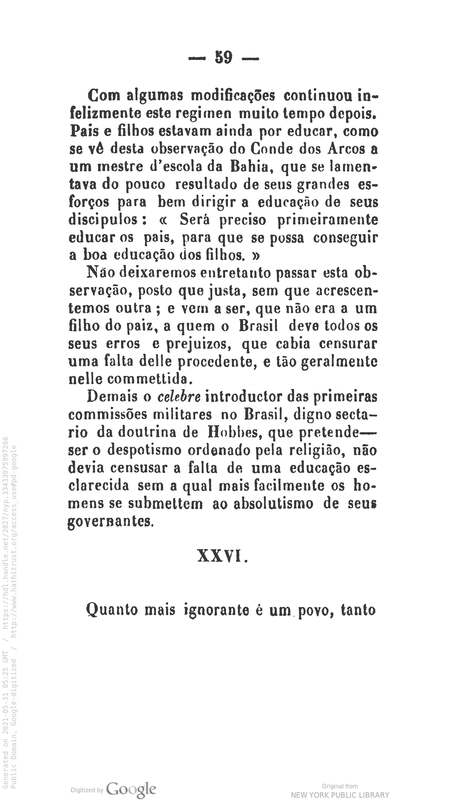|
[Originally published on Facebook March 31, 2021]
Our last post on Nísia Floresta is from Opúsculo Humanitário, which is the same book from our first post, and is about women’s education. Here is the passage: XXVI (p.59 of the book; 69 of the digitized version) “The more ignorant a nation is, the easier it is for an absolute government to exercise its unlimited power over it. It is from that principle, so contrary to the progressive march of civilization, that most men are against making easier how women cultivate their spirit. However, this is a mistake that has been and always will be contrary to the prosperity of nations as well as is contrary to the domestic fortune of men. (…) Just as a paternal government is the most proper one to make people happy, and a properly cultivated intelligence of those nations is the best incentive for them to fulfill their duties, so too is moral education the safest guide to women. It is the pole star that indicates their north, in the fragile struggle in which they have to navigate as a ship in the sea, a sea seeded with abrolhos (pointed coral reefs), which is called life. The lack of a good education is the primary cause that contributes to women to lose their north, which is nothing else but morality, in the midst of the corruption of society. Always seeking to hold their intelligence, to weaken their senses, they make women unable to occupy, as they should to begin with, the care of purifying their heart; women would never advantageously achieve such thing if their intelligence remains without culture.” As we have seen, Nísia Floresta was against slavery because it is a form of oppression of one people over another. Such oppression can be instantiated in many varieties: it can manifest on basis of color (Europeans to Africans), political views (Italian liberals versus their government and Brazilian liberals versus the Empire), or culture (colonization over the First Natives). This passage shows us that Nísia thinks that lack of education could be another instantiation of oppression because it willingly hinders the moral development of human beings. Since men were “against making easier” for women to learn, men were willingly hindering women’s moral development. Therefore, men were oppressing women. Thus, Nísia finds a common ground between colonized First Natives, enslaved people and women: they were all devoid of education. Worse than that, they were deprived of education by the oppressor, whoever it be. Further, Nísia compares the political influence of an absolute government over an ignorant nation to the power of men over women. Such comparison allows us to consider despotic governments as oppressors too. Thus, we may say that Nísia was against a universal form of oppression, a form that can be instantiated differently. If such oppression is justified by color, we call Nísia an abolitionist; if it is justified by sex, we call her a feminist, and so forth… However, I cannot make something of “a paternal government is the most proper one to make people happy”. She seems to be listing kinds of “guides”. Moral education is “the safest guide” for women. Cultivated intelligence is “the safest guide” for a nation that seeks the fulfilment of its duties. A paternal government is “the safest guide” to make people happy. Was she defending paternal governments or was she just saying that it does not matter how bad a ruler is, if the ruler rules paternally, then the people will not care? If the latter, she may have said that ironically, criticizing paternal governments. __ Retrieved from: https://babel.hathitrust.org/cgi/pt?id=nyp.33433075997266... Original in Portuguese: “Quanto mais ignorante é um povo, tanto mais fácil é a um governo absoluto exercer sobre ele o seu ilimitado poder. É partindo deste princípio, tão contrário à marcha progressiva da civilização, que a maior parte dos homens se opõem a que se facilite à mulher os meios de cultivar o seu espírito. Porém, é este um erro, que foi e será sempre funesto à prosperidade das nações, como à ventura doméstica do homem. (...) Assim como um governo paternal é o mais próprio a fazer a felicidades dos povos, e a inteligência destes devidamente cultivada o melhor incentivo para o exato cumprimento de seus deveres; assim também a educação moral é o guia mais seguro da mulher, a estrela polar que lhe indica o norte, no frágil batel em que ela tem de navegar por esse mar semeado de abrolhos, a que se chama vida. A falta de uma boa educação é a causa capital, que contribui para que a mulher, no meio da corrupção da sociedade perca esse Norte, o qual não é outro mais que a moral. Procurando-se sempre prender-lhe a inteligência, enfraquecer-lhe os sentidos, inabilitam-na para ocupar-se, como devia, antes de tudo do cuidado de purificar o seu coração; o que nunca poderá ela vantajosamente conseguir se a sua inteligência permanecer sem cultura.” Translated by Matheus Iglessias Mazzochi -MM
0 Comments
|
Authors
Jacinta Shrimpton is a PhD student in Philosophy at the University of Sydney. She is co-producer of the ENN New Voices podcast Archives
May 2024
Categories
All
|

 RSS Feed
RSS Feed